More Innovation:
5 Industries Taking Advantage of 5G’s Benefits
Updated: January 24, 2022
Taking Advantage of 5G’s Benefits
5G-enabled technologies have the power to transform and advance all industries in business. From connecting individuals in real-time to connected smart cities, the future looks different with 5G.
5G’s benefits are vast and plentiful but applying these features to various industries is the end goal. Let’s look at five sectors benefiting from 5G technologies today.
Healthcare
Going to the hospital is an exhausting process. From booking appointments, waiting months to see a physician and sitting in the waiting room for too long, all for a fifteen-minute consultation? 5G’s benefits to the healthcare system will completely transform the way we receive medical care.
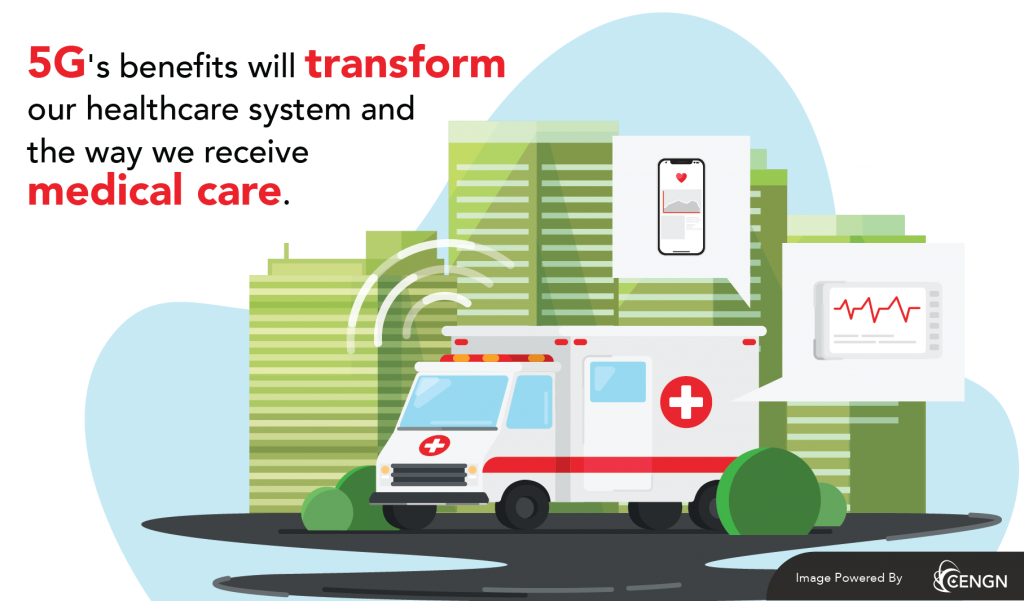
By introducing 5G into the healthcare industry, home healthcare and telemedicine are more effective and streamlined. Doctors see patients online, providing consultations through video streaming and access to whether a visit to a physical location is warranted. This reduces wait times, eliminates travel, decreases cross-exposure chances for patients, and reduces overall costs. 5G in the medical sector will upgrade all service forms, and the quality-of-care patients receive.
Suppose someone comes into the emergency room with an injury in the healthcare industry. In that case, staff have to work quickly to resolve the issue. Every problem in the emergency room is time-sensitive. This is also true if a paramedic were to show up on the scene of a bad accident and the individual needed urgent care, especially if the hospital is an hour’s drive away.
Assistance from 5G’s network could mean life or death.
5G is enabling “5G Ambulances”. Read more about it in this article on 6 Ways 5G is Improving our Healthcare System.
Using 5G networks and technologies, a paramedic arriving on the scene can now have access to communication with physicians at the hospital before arriving. This way, the paramedic is guided through procedures to perform before arriving at the hospital, potentially saving a life.
A more connected world provides higher survival rates, better working conditions, and improved patient care.
Manufacturing
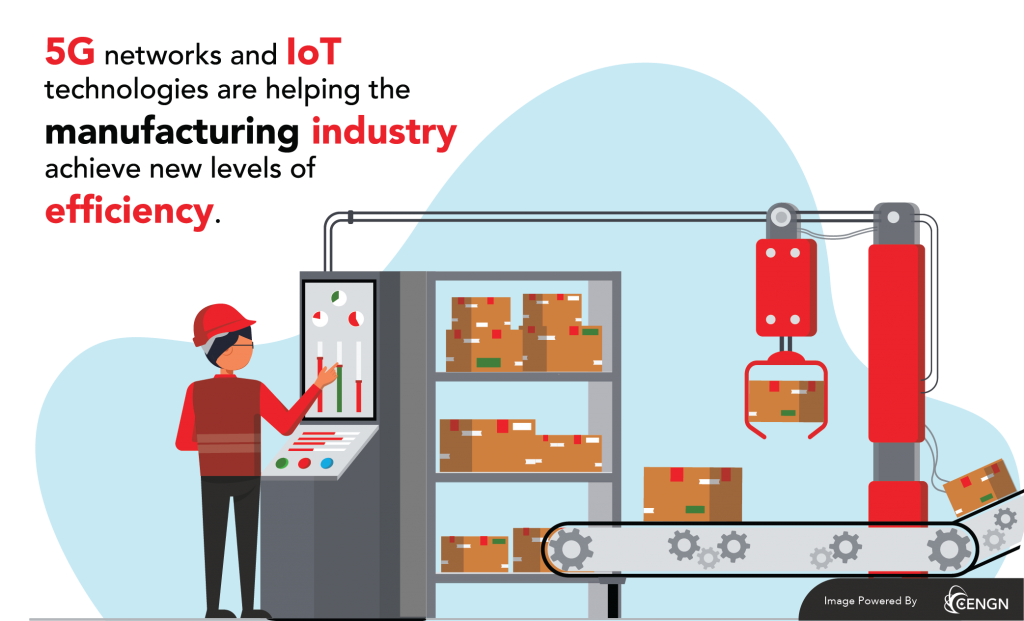
An improvement in connectivity means significant advancements in manufacturing operations. Currently, factories are enhancing the automation of processes through sensor communication. With the help of 5G networks and IoT technologies, the industry can achieve a new level of efficiency.
Using the benefits of 5G enabled networks, the manufacturing industry connects more devices, automating communications between systems through the cloud. Sensors can ping each other almost instantaneously, pushing actions on machinery based on the information provided. With less manual labour, the costs of running your business will drop, and the work your employees do will hold more meaning. As a result, company cultures also benefit from 5G.
With devices communicating tasks to each other, businesses can focus less on routine work and more time on items that accelerates the business.
Safety is a prominent issue in manufacturing processes. With IoT connectivity, sensors can detect safety hazards like instability in buildings or storage units and hazardous toxins to alert workers immediately. IoT also connects robots to carry out the most dangerous tasks. Working in the manufacturing industry with 5G’ benefits on your side is an experience that is safer than the norm.
Another feature of 5G networks’ advancement is virtual reality (VR). Applying this to an actual business situation: Imagine owning a manufacturing business with multiple engineers on the team. Senior engineers wearing 5G VR headsets could provide virtual help in real-time to junior engineers across the Earth. An expert in Finland could guide an engineer working from a location in Canada.
This type of assistance transfers over to other industries like retail too.
5G’s Benefits in the Retail Industry
Using 5G-enabled VR headsets, customers at home could walk around a virtual showroom and take a look at products. Virtual reality is a game-changing feature to grow a customer base and make a business accessible globally. Instead of limiting the company to customers in the region, the owner could create a virtual showroom so anyone can browse their wares from the comfort of their living room.
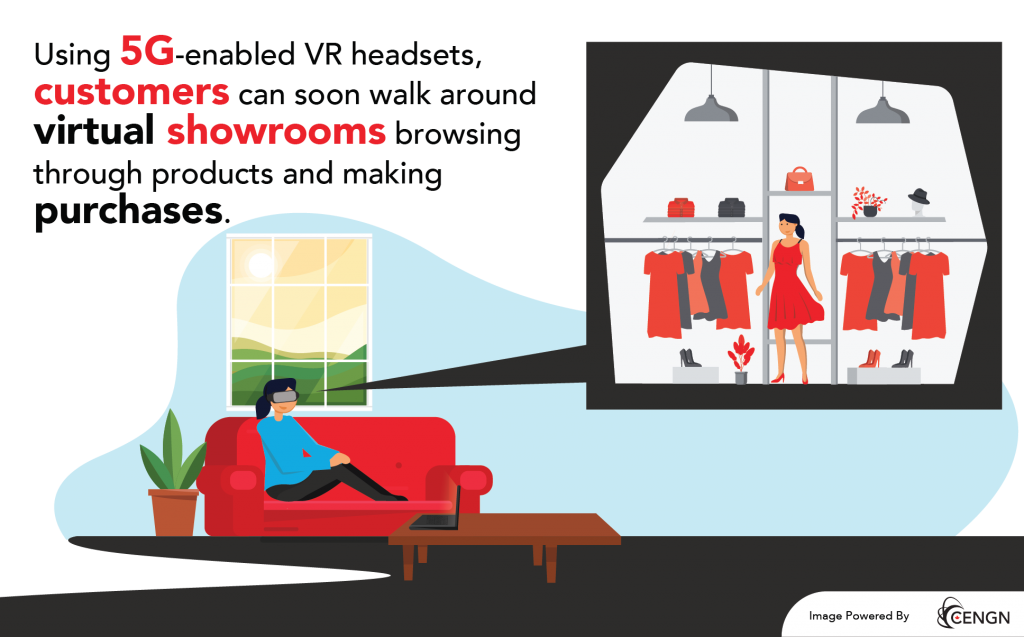
Better yet, augmented reality is blending VR into our lives to enhance the buyer experience. Leveraging augmented reality technologies, businesses can create an entirely virtual yet satisfying shopping experience. For example, think of a potential customer sitting at home looking at the different shoes available on a store’s webpage. Sizes often vary between brands, and some customers might be nervous to order shoes online if they don’t fit. Using augmented reality, that customer could pull out their smartphone and virtually try on those shoes using a filter or application.
Xesto, a computer vision start-up here in Canada does this using 3D smartphone cameras to help customers purchase shoes online.
Consumers won’t leave frustrated through a virtual store when every resource they need to improve their shopping experience is one click away.
Virtual stores sound entertaining, but what about the entertainment industry?
Entertainment
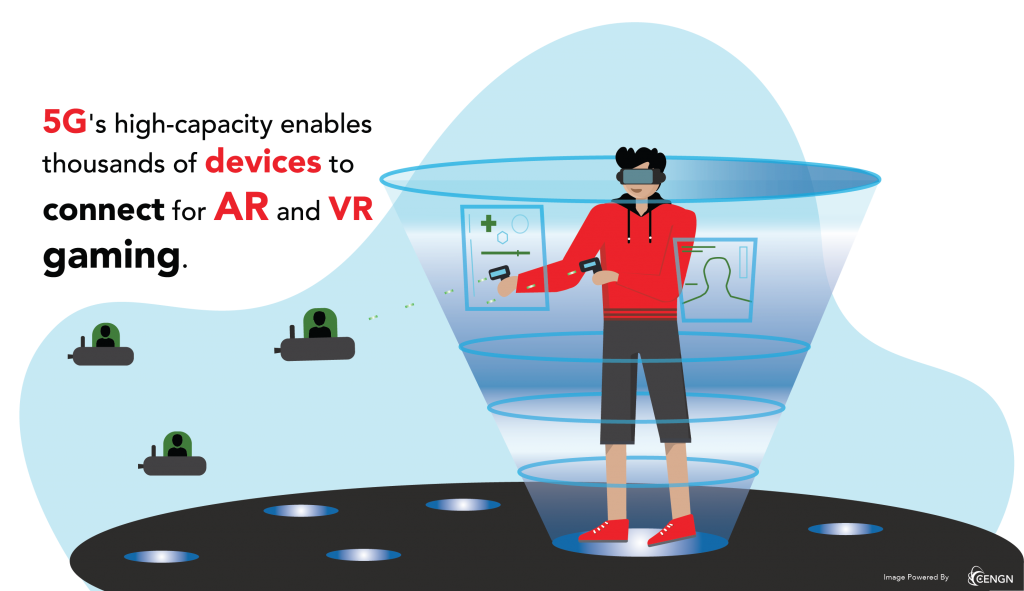
5G’s benefits are becoming huge to game developers in the next decade.
5G’s high capacity enables thousands of devices to connect for AR and VR games (Source: Telegraph.) Rather than sitting in front of the television chatting on a mic with your friends, you could be wearing a VR headset paired with sensor technology.
Leveraging VR technologies and the other benefits of 5G, games are more fun, immersive and realistic.
Automotive Industry
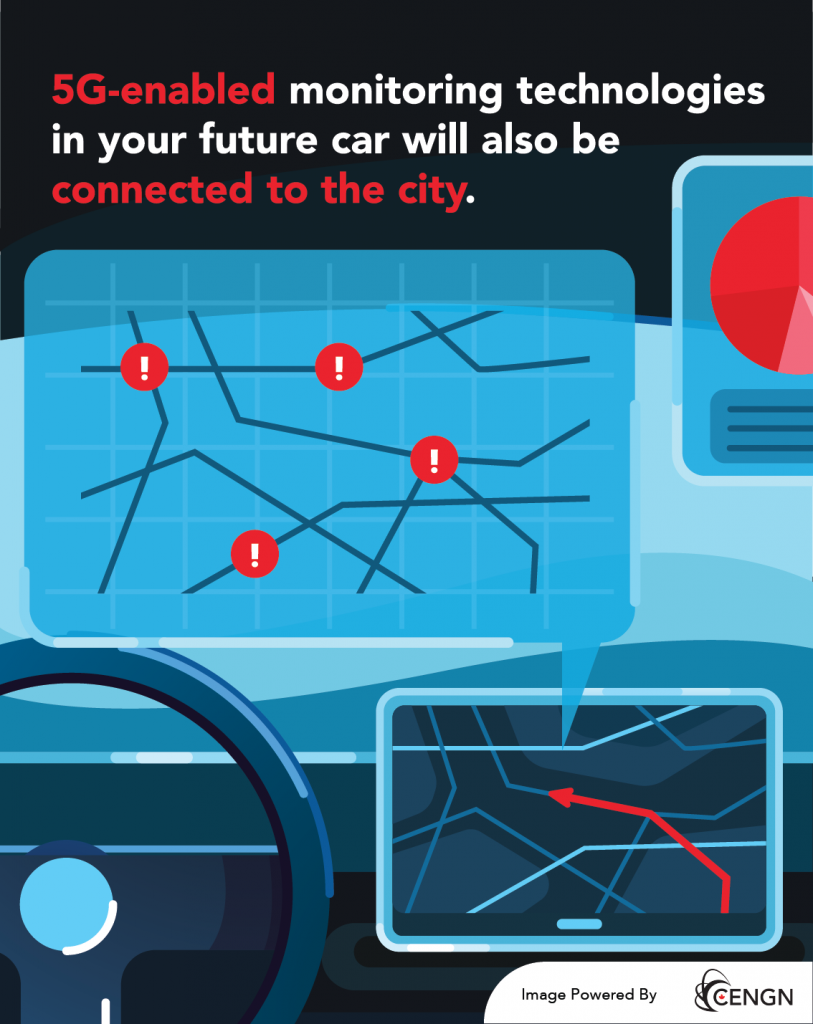
5G-enabled networks are transforming the automotive industry. Soon, driverless delivery trucks could deliver products automatically through smart city development.
Connecting through 5G’s network and multiple IoT devices, transport trucks truck will automatically communicate with sensors all over the city. These trucks will detect traffic flows, optimize for the quickest route, and communicate with the building it is delivering to for the correct area to dock and unload. With 5G’s benefits, businesses can offer more customer satisfaction with quicker deliveries and more efficient operations.
5G-enabled monitoring technologies in your future car will also be connected to the city, automatically finding the best traffic routes, free parking, and keeping you safe. Imagine the car you’re driving could detect you are having a medical issue. The vehicle can take control of the wheel, pull you over, and call for an ambulance (Source: Telegraph). As long as your car stays connected, you’re protected.
Did you know driverless cars can deliver up to a 20-30% improvement in energy savings? Read more about driverless cars and how enhanced connectivity combats climate change in our article, 5G: 4 Ways 5G is Helping the Environment.
From the design process to the sale of a vehicle, 5G’s benefits enable efficient, cost-effective business operations.
5G’s Benefits for Booming Business
Through the advancement of IoT and other 5G technologies, all industries have the opportunity to change the way they deliver products and offer services.
From smart cars and cities to real-time healthcare, consumers will benefit from 5G just as many business owners will. 5G has the potential to change the way we do business and satisfy society.
Are you interested in hearing more about 5G and other innovative technologies?
Download our “Next Generation Network Imperative” Whitepaper to find out what the future of next-generation technologies will look like.
The International Data Corporation (IDC), a world-renowned global market intelligence firm, was commissioned to complete this study.









